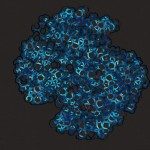Lien vers Pubmed [PMID] – 18456810
J. Bacteriol. 2008 Jul;190(13):4453-9
The small regulatory protein Crl favors association of the stationary-phase sigma factor sigma(S) (RpoS) with the core enzyme polymerase and thereby increases sigma(S) activity. Crl has a major physiological impact at low levels of sigma(S). Here, we report that the Crl effects on sigma(S)-dependent gene expression, the H(2)O(2) resistance of Salmonella enterica serovar Typhimurium, and the resistance of this organism to acidic pH are greater at 28 degrees C than at 37 degrees C. Immunoblot experiments revealed a negative correlation between sigma(S) and Crl levels; the production of Crl was slightly greater at 28 degrees C than at 37 degrees C, whereas the sigma(S) levels were about twofold lower at 28 degrees C than at 37 degrees C. At both temperatures, Crl was present in excess of sigma(S), and increasing the Crl level further did not increase the H(2)O(2) resistance level of Salmonella and the expression of the sigma(S)-dependent gene katE encoding the stationary-phase catalase. In contrast, increasing the sigma(S) level rendered Salmonella more resistant to H(2)O(2) at 28 degrees C, increased the expression of katE, and reduced the magnitude of Crl activation. In addition, the effect of Crl on katE transcription in vitro was not dependent on temperature. These results suggest that the effect of temperature on Crl-dependent regulation of the katE gene and H(2)O(2) resistance are mediated mainly via an effect on sigma(S) levels. In addition, our results revealed that sigma(S) exerts a negative effect on the production of Crl in stationary phase when the cells contain high levels of sigma(S).

